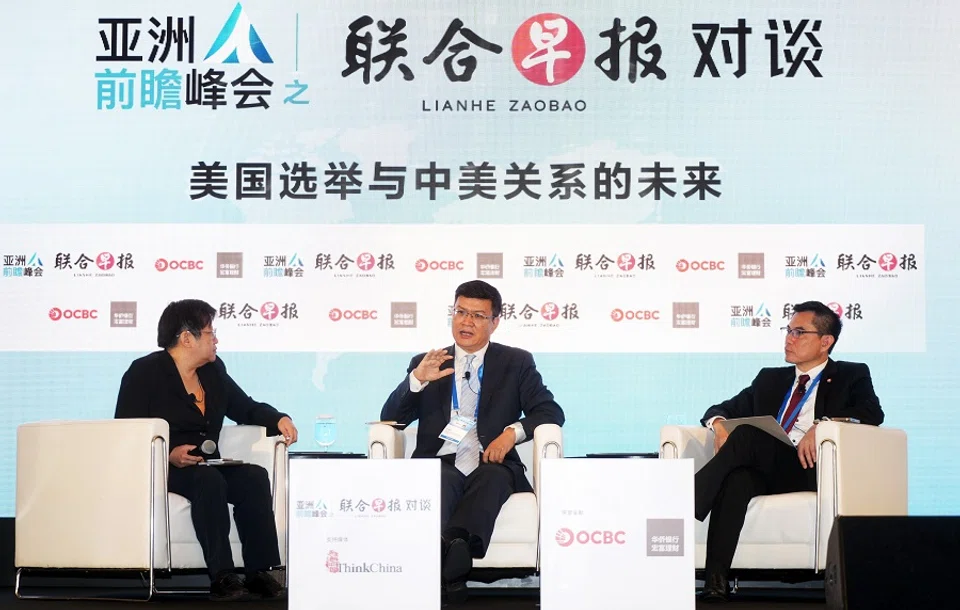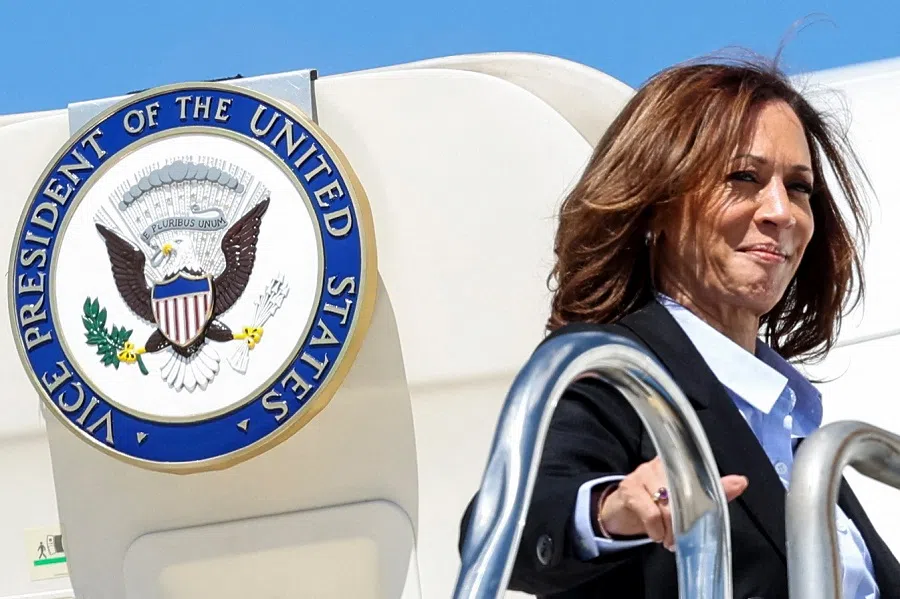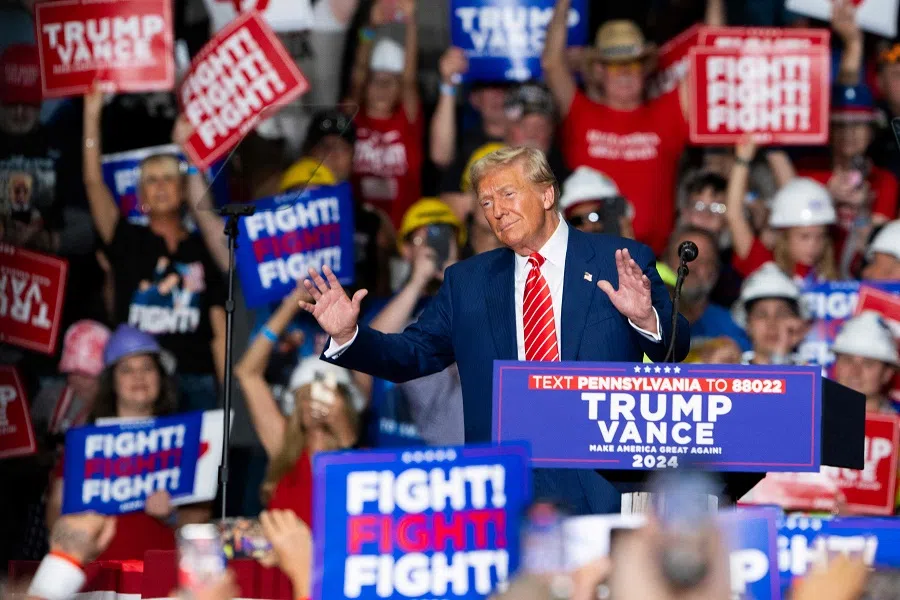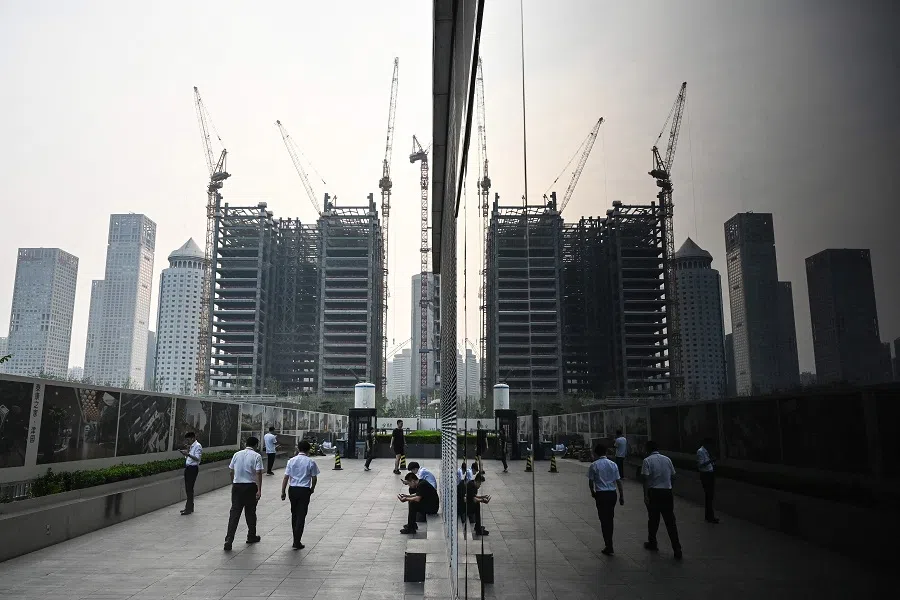A Harris administration might redefine China-US ‘competition’: Tsinghua expert Da Wei
At the Lianhe Zaobao Conversations held on 3 September, Da Wei, director of the Center for International Security and Strategy and professor at the Department of International Relations at Tsinghua University, said that stable China-US relations are more likely to continue if Democratic candidate Kamala Harris is elected as the next US president. Lianhe Zaobao’s China news associate editor Chua Eng Wee tells us more.

The key to determining the future direction of the US lies in the upcoming presidential election. The outcome of this critical election will also influence the trajectory of China-US relations.
If Democratic presidential candidate Kamala Harris is elected, the current stability in China-US relations is likely to continue and may evolve into a new normal; if Republican presidential candidate Donald Trump is elected, China and the US would once more be at loggerheads, potentially disrupting the stability of bilateral relations.
At the Lianhe Zaobao Conversations held on 3 September as part of the Asia Future Summit (AFS) series, Da Wei, director of the Center for International Security and Strategy and professor at the Department of International Relations at Tsinghua University, gave a speech on the theme of “US Elections and the Future of US-China Relations”.
... they could mark a generational transition for the US, moving from the era defined by the current President Joe Biden and Donald Trump to a new generation. — Professor Da Wei, Director, Center for International Security and Strategy, Tsinghua University
Generational shift in the US
Da opined that the US presidential elections in November are highly significant, as they could mark a generational transition for the US, moving from the era defined by the current President Joe Biden and Donald Trump to a new generation.
He explained that the new generation of Democrats and Republicans, represented by Harris and Trump’s vice-presidential candidate JD Vance respectively, is moving to the forefront. Regardless of who wins the elections, these young politicians are set to helm the US in the future.
Their respective political parties could potentially secure 12 consecutive years in office. If the Republicans win, Trump could serve a four-year term, followed by Vance possibly serving for eight years. Conversely, if the Democrats win, Biden, who has already served four years, would be succeeded by Harris, who might serve for four years and then win another term, effectively extending Democratic leadership to 12 years.
“So, be it the Democrats or the Republicans, their consecutive terms in office will significantly determine the future direction of the US.”
Trump is often seen as unpredictable, and given that he has not been in office for four years, the Democrats are generally considered more predictable than the Republicans. — Da

Da’s research expertise covers China-US relations and US security and foreign policy. He worked for more than 20 years at the China Institutes of Contemporary International Relations under China’s Ministry of State Security, and served as director of its Institute of American Studies among other roles. Da was also a visiting senior fellow at the Atlantic Council of the US, as well as a visiting senior associate at the School of Advanced International Studies at Johns Hopkins University.
Two scenarios
According to Da’s observations, both the Democrats and Republicans have moved away from neoliberalism, shifting towards nationalism and populism, and they share similar stances on China. However, there are notable differences between the two parties. Trump is often seen as unpredictable, and given that he has not been in office for four years, the Democrats are generally considered more predictable than the Republicans.
Da assessed that such a difference would to a large degree affect how long it would take for China-US relations to stabilise after the presidential elections, as well as how the path towards stabilisation would play out. He offered two possible future scenarios.
If Harris is elected, Da predicts that the two countries could redefine their “competition” with each other.
The first scenario is if Harris were to win the elections, China-US relations could move towards a form of new normal. Although the development of bilateral relations might still face challenges, the current state of stability would likely continue. The boundaries or “flashpoints” in economic and security issues would gradually become more stable and clearer over the next four years.
In this scenario, the concept of China-US relations might also be redefined. The US has long defined China-US relations in terms of strategic competition, which China disagrees with. Instead, China thinks that the US is implementing a policy of suppression to impede China’s development. While competition between China and the US is inevitable in areas such as the military, artificial intelligence and strategic technologies, the differences in international order, ideology and geopolitics are exaggerated. If Harris is elected, Da predicts that the two countries could redefine their “competition” with each other.

The second scenario is that Republican Trump gets elected and China-US relations face significant challenges in the short term.
Da predicts that China and the US will face further confrontation, which will delay the stabilisation of their relationship. A new round of trade and tech war may erupt, and people-to-people exchanges are likely to face renewed obstacles. China will inevitably launch a counterattack, which would escalate confrontation between both sides.
Notwithstanding, Da thinks that China-US relations can still be stabilised, but it will take two or three years more, or even longer, compared to the first scenario.
Lessons learned over past four years
Responding to a question from moderator Han Yong Hong, associate editor of Lianhe Zaobao, during the dialogue segment, Da said that China-US relations have finally stabilised and are on the right track since the two heads of state met in San Francisco in November last year; and US national security adviser Jake Sullivan’s visit to China last week also served to summarise the experiences and lessons of the past four years in the bilateral relationship.
Da hopes that, regardless of who wins the election, the lessons learnt from Biden’s four years of trial and error will help ensure that the stabilised China-US relationship is carried over into the next administration and the following US political cycle.
.... it would be extremely difficult for such opportunities for stabilisation to arise again if China and the US were headed towards military confrontation. — Da

However, Da does not rule out the possibility that China-US relations could worsen, making it difficult for opportunities for stabilisation to emerge.
He said that it would be extremely difficult for such opportunities for stabilisation to arise again if China and the US were headed towards military confrontation. “Whether China-US relations can withstand such a shock and whether you can do the right thing when you think that the other side is doing the wrong thing — I think that is a big test for China,” he noted.
Da thinks that China and the US must ultimately find a way to coexist. Amid great power competition, the country that makes fewer mistakes will endure to the end. But he hopes that both China and the US will make fewer mistakes and that both countries can better develop to benefit the world, including Southeast Asian countries, as well as to find a new dynamic balance in the new international environment, not only stabilising China-US relations but also international politics.
The Lianhe Zaobao Conversations as part of the AFS Series is proudly presented by OCBC and OCBC premier banking, with ThinkChina — an English-language e-magazine powered by Lianhe Zaobao — as supporting media.
This article was first published in Lianhe Zaobao as “达巍:哈里斯若当选美国总统 中美关系当前稳定将延长”.





![[Big read] When the Arctic opens, what happens to Singapore?](https://cassette.sphdigital.com.sg/image/thinkchina/da65edebca34645c711c55e83e9877109b3c53847ebb1305573974651df1d13a)